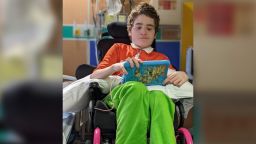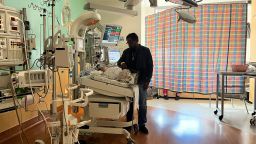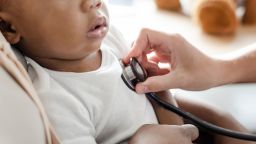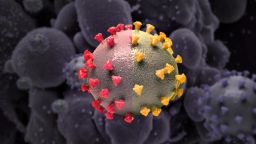The behaviors that helped keep us safe from Covid-19 over the past 2½ years – lockdowns, physical distancing, wearing masks, washing hands – are probably behind the “unprecedented” early surge in RSV infections this year, scientists say.
These factors may also have thrown other seasonal respiratory viruses out of whack around the globe.
“As long as we’ve had a record of RSV and other respiratory diseases in the United States, there have been these very regular patterns of outbreaks,” said Rachel Baker, an epidemiologist and assistant professor at Brown University.
“RSV pops up every year in the late autumn/wintertime and has these outbreaks mostly in young kids. Then it disappears again for the spring/summer months and pops up again the following winter,” Baker said. “It’s very regular and predictable” – until it isn’t.
Cases of RSV, or respiratory syncytial virus, in the United States started showing up in the spring and are now 60% higher than 2021’s peak week, a CNN analysis shows, and that’s probably an undercount.
Across the US, the number of flu cases has also been increasing a little earlier than usual. A handful of schools have seen large absences, and medical offices say they are seeing more people sick with other respiratory viruses at times that don’t fit the usual patterns.
There have been similar unusual patterns in respiratory infections such as adenovirus, parainfluenza and rhinovirus in other countries, too.
Scientists think unparalleled actions of the pandemic had unparalleled effects.
Covid interventions stopped other viruses, too
“The degree of societal changes that occurred with the Covid pandemic really is unprecedented in modern day,” said Dr. Kevin Messacar, an associate professor in the Department of Pediatrics at Children’s Hospital Colorado.
Like Covid-19, RSV and the flu spread through droplets released into the air when people cough or sneeze. The droplets also linger for hours on frequently touched surfaces like doorknobs and light switches.
So the people who washed hands and disinfected surfaces, who wore masks and kept their distance from others, did more than stop the spread of the coronavirus.
“Those interventions, while they were great at limiting the spread of Covid-19, they also did a really good job of limiting the spread of other respiratory diseases such as RSV and influenza,” Baker said.
There was a sudden dropoff in RSV cases and hospitalizations in the seasons of 2020 and 2021, studies have showed, as well as unusually tame flu seasons.
“It was really striking,” Baker said.
But as Covid-19 vaccines and treatments became available, more people started going back to school and work and interacting without masks. They also started sharing germs.
The pandemic behaviors created an “immunity gap” or “immunity debt” that makes more people in the US vulnerable to diseases like RSV.
Understanding the immunity gap
Children build natural immunity to viruses when they’re exposed to them. Most kids catch RSV at some point before they turn 2, the US Centers for Disease Control and Prevention says. Newborns get some passive protection from their mothers, who pass along antibodies through breast milk.
But for a couple of years, there was little opportunity for children born during the pandemic or the people around them to catch RSV – or other viruses, for that matter. Their immunity waned or never formed at all. So when those little ones and their parents started to interact with others, they were more likely to get sick.
“Decreased exposure to endemic viruses created an immunity gap – a group of susceptible individuals who avoided infection and therefore lack pathogen-specific immunity to protect against future infection,” Messacar and Baker wrote this summer in a commentary published in the medical journal The Lancet.
They warned hospitals that they needed to remain flexible and prepared for unpredictable seasons of respiratory illnesses because of this gap.
“We knew it was inevitable that these diseases would come back,” Messacar told CNN.
The commentary warned about an influx of infections that would include older children who hadn’t been exposed to viruses as well as newborns whose moms weren’t able to pass along antibodies because they hadn’t been in contact with these germs.
“Now we’re seeing it’s spreading really well,” Baker said. “And it’s not just striking the kids that it would typically strike with that first birth cohort. It’s also creating infections in older kids.
“That’s how infectious diseases work,” she added. “Once you have more cases, they create more cases, and you get this spike.”
Baker and Messacar don’t think this early-season pattern with RSV is permanent, but it could take a while to return to its more predictable cycle.
“Now we’re in a little bit of a strange period, but I think in the next few years, we’ll start to see those regular outbreaks – well, depending on what happens with Covid,” Baker said. If the coronavirus gets bad enough that more lockdowns are necessary, it could once again throw off the seasonality of other viruses.
With viruses like the flu, there are more variables involved, Messacar said.
There’s no vaccine to prevent RSV, but there is for flu, so if the flu shot is a good match for the strain in circulation and enough people get it, the country could avoid a spike in cases like it’s seeing now with RSV.
Scientists are working on an RSV vaccine, but it won’t come in time to help this season.
What you can do
In the meantime, there are some things to do to limit the spread of RSV, and they’ll sound very familiar.
Get CNN Health's weekly newsletter
Sign up here to get The Results Are In with Dr. Sanjay Gupta every Tuesday from the CNN Health team.
Wash your hands. Keep frequently used surfaces clean. Sneeze or cough into a tissue or into your elbow rather than your hands. Boost your immunity by getting plenty of sleep and eating a healthy diet. Wear a mask, especially when you’re sick. And most important, if you’re sick, stay home.
“These non-pharmaceutical interventions all work, clearly, and the more we can do to keep cases of any of these viruses down, the better,” Baker said.
Health - Latest - Google News
October 26, 2022 at 08:55PM
https://ift.tt/QbKGcyM
Behaviors that helped keep us safe from Covid-19 are probably behind surge in RSV cases, scientists say - CNN
Health - Latest - Google News
https://ift.tt/TvYwKFt






No comments:
Post a Comment